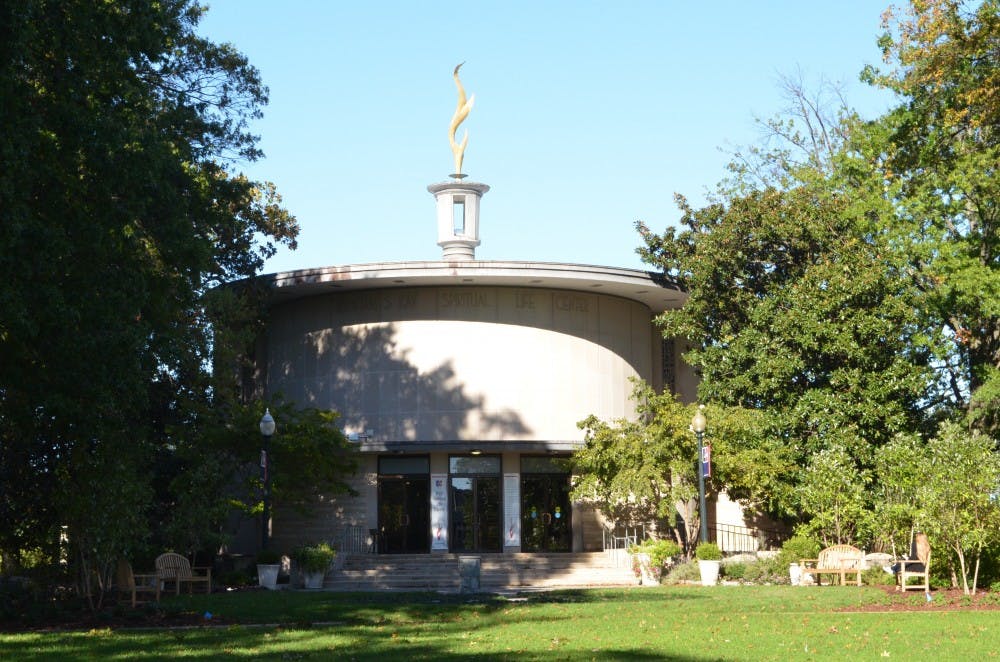Rev. Mark Schaefer was appointed the University chaplain on Sept. 1 after 16 years of service in Kay Spiritual Life Center.
Schaefer came to AU through a pastoral internship with the Kay Spiritual Life Center. During his first two years Schaefer said he was impressed with the AU community and wanted to stay. Many on campus know Schaefer from the next 14 years he spent as the University’s United Methodist chaplain.
In June 2016 Schaefer was appointed interim University chaplain after former University chaplain, Reverend Joe Eldridge, retired. Schaefer said his job as interim University chaplain demanded more time than his previous position as United Methodist chaplain.
“There’s more areas of intersection between this office and all the other offices on campus,” Schaefer said. “It was a good kind of busy.”
Schaefer’s new position was tested by a summer filled with tragic events.
“It was a difficult summer,” Schaefer said. “There were a lot of things going on in the news, in the world, that were troubling.”
Schaefer noted that police violence, attacks in Nice and the Brexit vote were just some of the startling events that shook communities everywhere. He wanted to make time to address the community’s emotional well-being and felt responsible for opening a dialogue on campus about the events over the summer.
These ideas gave rise to an interfaith service of prayer on July 22. Though students on campus are few during the summer, Schaefer said around 80 faculty and staff members participated, and seemed to really appreciate the opportunity to reflect together.
Administrators in Kay decided to expand the services regularly, calling them interfaith chapel services which are held the first Wednesday of every month in the chapel.
In light of the recent race-related acts on campus, Schaefer feels strongly about how the community should respond to racism.
“We need to speak out strongly against any racist act on our campus, in the residence halls, in the classrooms, in our workplaces,” Schaefer said. “In addition, it is very important to listen to the voices of our students, faculty, and staff of color, to appreciate and to validate their experiences on our campus, so that we as a whole community might live into a more just, more inclusive community.”
Schaefer preached another interfaith prayer sermon on Wednesday, Oct. 6 about this issue.
“One of the things that I am committed to as University Chaplain is to creating spaces where we can encounter one another in more than dialogue, more than information sharing, but in learning to see through one another’s eyes,” Schaefer said in an email. “Facilitating that kind of encounter can go a long way toward building the kinds of relationships—and thus the kind of trust—that is necessary for healing on campus.”
In terms of future events, Schaefer says activities like the Table Talk Lunch Series, comprised of guest speakers and discussions on ethics, as well as usual services can be expected. However, Schaefer has some other ideas in store for improving dialogue on campus.
Developing existing relationships and cultivating new ones on campus is important to Schaefer’s vision for AU. He said he plans to do so gradually while taking the atmosphere on campus into consideration.
One of Kay’s first steps in this direction is its new weekly newsletter, the Communi-Kay -- pun intended, according to Schaefer. It is available through the Kay Spiritual Life Center’s web page on the AU website and as an email subscription.
Additionally, Schaefer said he wants to act as an intermediary between people who perceive one another as opposites. Rather than hold a debate or panel, Schaefer said he imagines a situation in which “person A and person B sit across a table with [him] and sort of talk about how each sees the other through their own eyes.”
Schaefer hopes these kinds of discussions will lead people to question perceived differences between groups of people.
“The experience is meant so that two people come to understand what they look like through someone else’s eyes rather than, ‘How can I convince this person to be like me?’” Schaefer said. “And to kind of show, ‘Look you can have two people, you know, on opposite sides of an issue, who we assume are very different and really they’re not that different.’”





